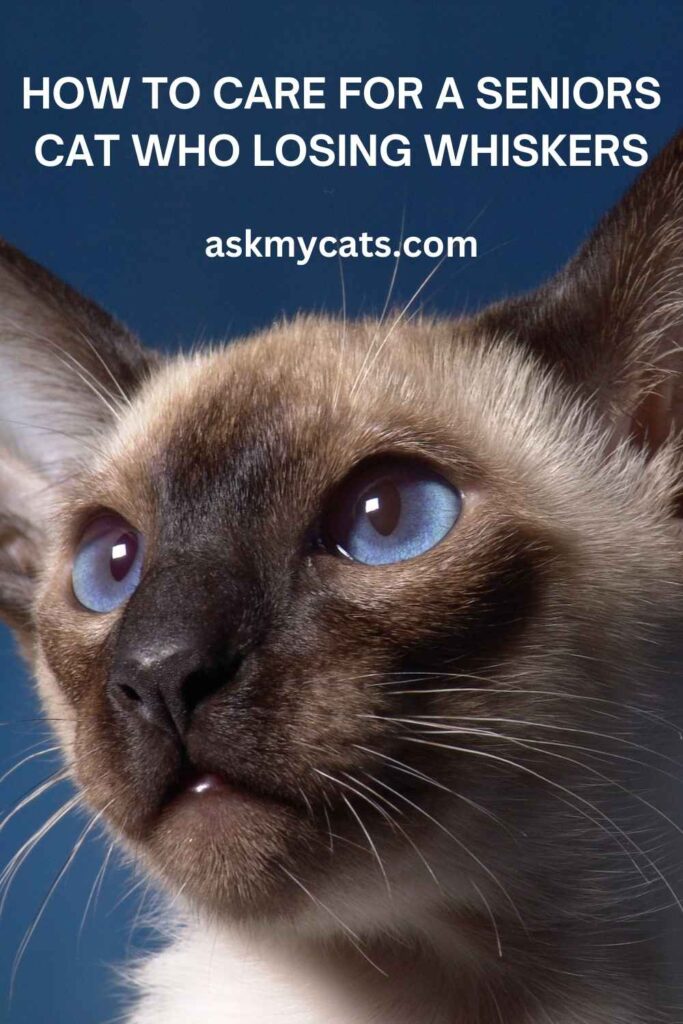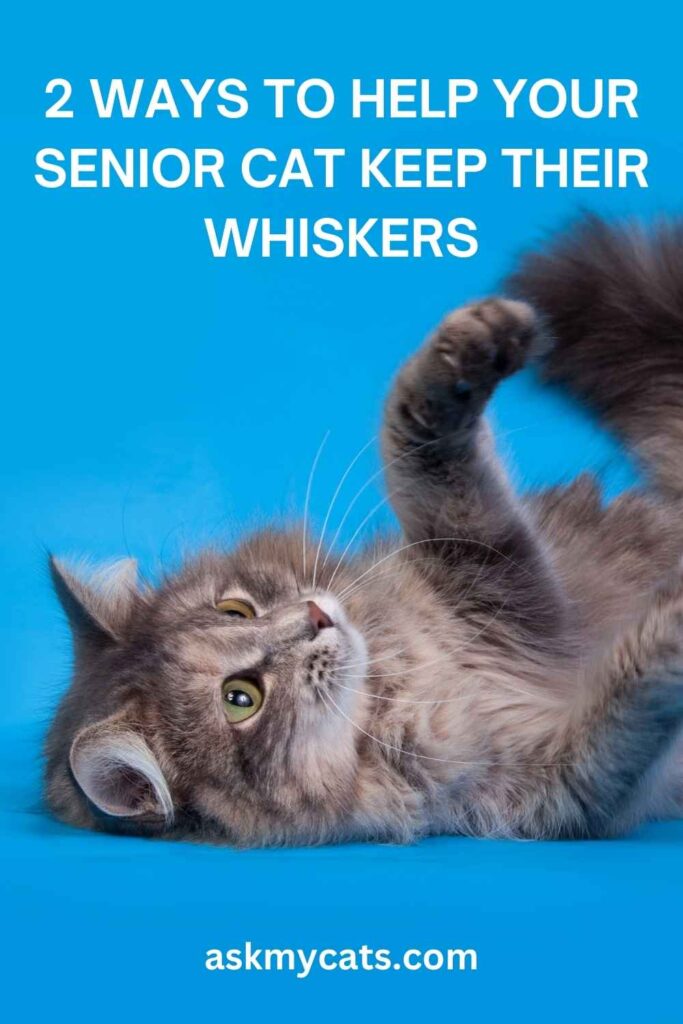The older a cat gets, the more susceptible it becomes to illness and disease. And unfortunately, this is when we start to see cats slowly begin to lose their luster. One of the first things that will go when your cat begins to age is its whiskers.
As you may know, cats use their whiskers for several different things: helping them navigate in the dark, detecting if they can fit through small spaces, and even letting them know if another cat is nearby.
Therefore, it shouldn’t come as much of a surprise that senior cats who are losing their whiskers are also at risk of losing their independence as well as falling victim to bullying by other cats. Read on to learn more about caring for an aging cat who is losing its whiskers.


Give Your Cat the Perfect Day
Get the Free Ebook!
Do Cats Lose Whiskers As They Age?
Yes, cats tend to lose more whiskers as they age. This is completely normal and there is nothing to be concerned about.
In the prime of their age, cats can lose anywhere between 1 and 4 whiskers every shedding cycle.
However, as they age, the same cats will start losing as many as 8 whiskers per shedding cycle. It is a normal consequence of aging and you don’t need to worry too much about it.
What Are The Effects of A Senior Cat Losing Its Whiskers?

When your cat loses its whiskers, it’ll begin to lose its sense of space as well.
Cats use their whiskers in order to aid them in determining just how close they are to another object, including their own body.
This means that they use them as a way of knowing where they’re going so they don’t bump into things.
This is why you might notice an older cat bumping its face against things more often, as well as bumping other cats as a means of communicating.
In the past, cats used their whiskers in order to maintain a certain distance between themselves and other cats. They’ll continue to use them for this purpose even after they begin to go missing.
When your cat loses its whiskers, it’ll also lose the ability to detect if it can fit through a small space. This is because they use their whiskers in order to determine if they’re able to pass through an opening that they’re trying to fit through.
This is why you might notice your older cat becoming more aggressive when you try to take it to the vet. It’ll be trying to push through the opening in order to prevent itself from getting trapped.
Check out the various Reasons Behind Cat Losing Whiskers
Is It Normal For Older Cats To Lose Whiskers?
As they age, cats do lose more of their whiskers. Since this is completely natural, there is no need to be concerned.
When they are at their best, cats might shed anywhere from one to four whiskers with each cycle. But as the cats age, they begin to lose up to 8 whiskers per shedding cycle.
Since it’s a common side effect of becoming older, you shouldn’t worry too much about it.
It is perfectly normal for older cats to lose whiskers.
Interesting Read: Why Is My Cat Losing Whiskers On One Side?
Why Is My Old Cat Losing Whiskers?
Your old cat may be losing whiskers due to any one of the 2 following reasons:
Reason 1 – Natural consequence of aging.
Your cat may be losing whiskers as a natural consequence of aging. As mentioned, this is nothing to be worried about. It is completely normal.
Reason 2 – Increased risk of skin infections due to lack of grooming.
As your cat gets older, it becomes more and more infrequent in grooming itself. This makes it more susceptible to skin infections than it was when it was younger. And as a natural consequence of skin infections, your old cat may lose more and more whiskers.
Do Cats Whiskers Change With Age?
No, there isn’t any significant change in a cat’s whiskers with age. The whiskers may become slightly weaker, but they still perform the same functions of sensory input, perception, and navigation.
The hair follicles, however, may become weak. So, your cat may have a lesser number of whiskers as it ages, and that’s why it may experience difficulty in navigating. But the quality of whiskers as such is not affected due to aging.
Must Read: Can A Cat Live Without Whiskers?
How To Care For A Senior Cat Who Losing Whiskers

As mentioned above, you’ll notice that your older cat is losing more and more numbers of its whiskers as it gets older.
However, there are a few things you can do in order to help it maintain its independence.
Create a Safe Environment
It’s important to create an environment in your home that is safe for your older cat.
This means making sure there are no small spaces that the cat can get stuck in, as well as removing anything that can cause an injury.
Reduce Anxiety
When your older cat loses its whiskers, it’ll begin to get anxious. This is because it’ll no longer be able to sense when another cat is nearby.
You can reduce your cat’s anxiety by making sure there are plenty of places for it to hide. This can be anything from cat trees to cardboard boxes.
Reward Patience
If your older cat begins to get anxious, you should try to remain patient. It’s important to let your older cat know that everything is okay.
Don’t get angry if it tries to push past you or if it knocks something over. Instead, reward it when it remains calm.
Interesting Read: Why Do My Cat’s Whiskers Keep Breaking Off?
2 Ways To Help Your Senior Cat Keep Their Whiskers

There are a few ways that you can help your older cat keep their whiskers for a longer period of time.
Feed Premium Food
The first thing you should do is make sure your older cat is eating premium food. A high-quality diet will provide your cat with the nutrients and vitamins that it needs to remain strong.
This, in turn, will help your cat keep its whiskers longer.
A good diet will also help to prevent other diseases and illnesses that are common in older cats.
So, lesser infections will mean lesser chances of whiskers falling out due to skin problems and itching.
Provide Adequate Water
Another way that you can help your older cat maintain their whiskers is by providing them with a constant source of water.
It’s important to provide a constant source of water because many older cats begin to drink less water as they age. This is because they don’t get as thirsty as they used to.
Providing your older cat with a constant source of water will make sure that they stay hydrated, which in turn will help them keep their skin and their whiskers healthy, along with their overall health.
3 Tips For Senior and Aging Cats Who Are Losing Their Whiskers
If your cat is starting to lose their whiskers, there are a few things you can do in order to help them out.
Tip 1 – Create A Protected Area
If your older cat is losing their whiskers, it’ll be important for you to provide it with a protected area. This can be anything from a cat tree to a cardboard box.
Just make sure that the area is tall enough for your cat to feel protected, but low enough for them to be able to jump down from it.
Tip 2 – Try A Gentle Grooming Brush
You may also want to invest in a gentle grooming brush. This will help you to help keep your cat’s whiskers well groomed.
A gentle grooming brush will also help you to remove any loose fur that your cat may have, as well as prevent matting.
Tip 3 – Provide A Soft Bed
Last but not least, you may want to provide your cat with a soft bed. This will help to keep your cat comfortable while it experiences more and more symptoms of aging, such as losing its whiskers.
It’ll also help to reduce any anxiety that your cat may be experiencing due to the loss of its whiskers.
Frequently Asked Questions
What is considered old age for a cat?
Cats are now classified as old once they reach the age of 11, senior cats are those who are between the ages of 11 and 14, and super-senior cats are those who are 15 years and older. In recent years, feline ages and life stages have been revised.
Why do old cats get bony?
Cats need more nutrients as they become older since they can’t digest their food as properly. They will lose muscular mass if their nourishment does not satisfy their needs, making it possible to readily feel their spine and hip bones when touching them.
Final Words
When a cat begins to age, its whiskers are the first thing to go. It’s important for you to make sure that your older cat continues to be active, eat a healthy diet, and receives plenty of water. A healthy lifestyle will ensure that your older cat ages gracefully.
When your cat begins to lose its whiskers, it’ll be important for you to make sure that it has a safe place to sleep. You can do this by providing a soft bed for your cat.
You can also create a protected area for your cat by creating a cardboard box or a cat tree. Other than that, there isn’t much you can do to prevent your cat from losing its whiskers.
Must Read: What Happens If You Cut/Trim A Cat’s Whiskers?
